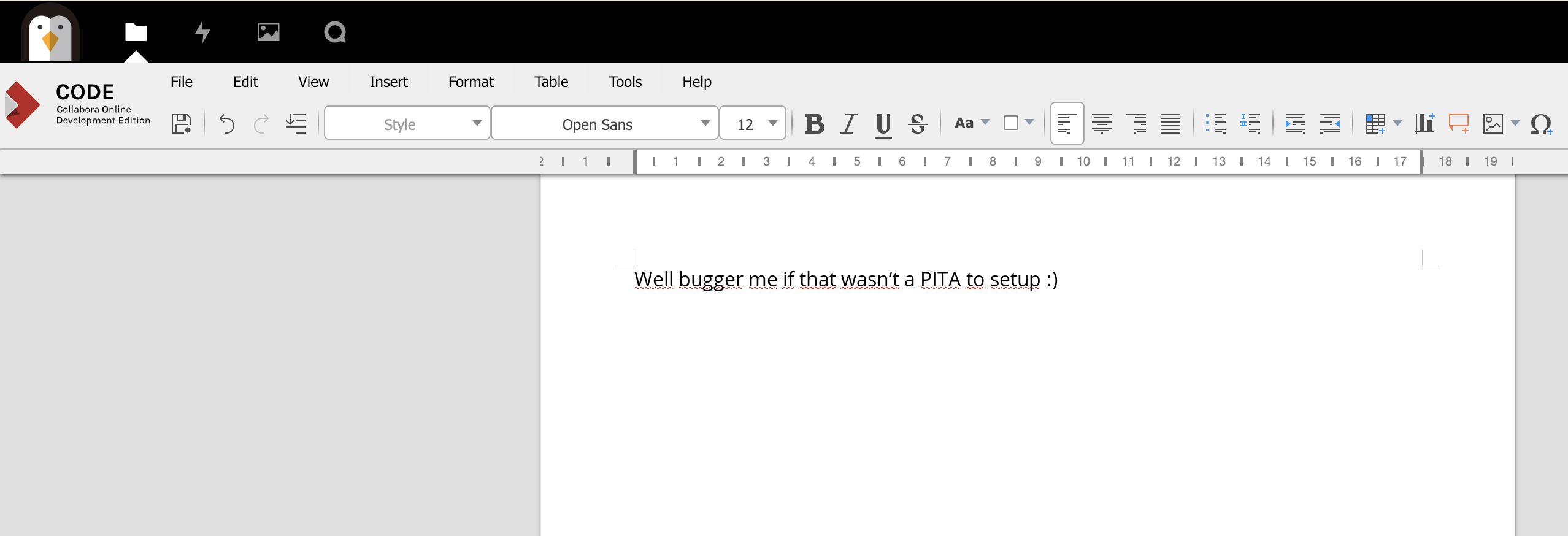

To deploy your application across the swarm, use `docker stack deploy `. All containers will be scheduled on the current node.

WARNING: The Docker Engine you 're using is running in swarm mode.Ĭompose does not use swarm mode to deploy services to multiple nodes in a swarm. we launch collabora itself, by docker-compose up -d

Launching Collabora is ( for now) a 2-step process.
Hosted collabora online how to#
There's no documented way to make Collabora work with Docker Swarm, so we're doing a bit of a hack here, until I understand how to pass these arguments via environment variables.

Version : "3.0" services : nginx : image : nginx:latest networks : - traefik_public deploy : labels : # traefik common - traefik.enable=true - =traefik_public # traefikv1 - =Host: - traefik.port=80 - =true # traefikv2 - ".rule=Host(``)" - ".=80" - "traefik.enable=true" # uncomment this line if you want to force nginx to always run on one node (i.e., the one running collabora) #placement: # constraints: # - node.hostname = ds1 volumes : - /var/data/collabora/nf:/etc/nginx/conf.d/nf:ro networks : traefik_public : external : true Serving ¶ Generate loolwsd.xml ¶ Setup Docker Swarm ¶Ĭreate /var/data/config/collabora/collabora.yml as follows, changing the traefik frontend_rule as necessary:
Hosted collabora online update#
The way we do this is we mount /var/data/collabora/loolwsd.xml as /etc/loolwsd/loolwsd.xml-new, then allow the container to create its default /etc/loolwsd/loolwsd.xml, copy this default over our /var/data/collabora/loolwsd.xml as /etc/loolwsd/loolwsd.xml-new, and then update the container to use our /var/data/collabora/loolwsd.xml as /etc/loolwsd/loolwsd.xml instead ( confused yet?)Ĭreate an empty /var/data/collabora/loolwsd.xml by running touch /var/data/collabora/loolwsd.xml. Until we understand how to pass trusted network parameters to the entrypoint script using environment variables, we have to maintain a manually edited version of loolwsd.xml, and bind-mount it into our collabora container. Upstream collabora-upstream Create loolwsd.xml ¶ We'll need a directory for holding config to bind-mount into our containers, so create /var/data/collabora, and /var/data/config/collabora for holding the docker/swarm config Here's a ( highly technical) diagram to illustrate: It's just a rendering / GUI engine after all, it doesn't hold any persistent data. What if we're running multiple nodes in our swarm, and nginx ends up on a different node to the one running Collabora via docker-compose? Well, either constrain nginx to the same node as Collabora ( example below), or just launch an instance of Collabora on every node then. Now incoming requests to will hit Traefik, be forwarded to nginx ( wherever in the swarm it's running), and then to port 9980 on the same node that nginx is running on. We attach the necessary labels to the Nginx container to instruct Trafeik to setup a front/backend for collabora.
Hosted collabora online code#
We run a single swarmed Nginx instance, which forwards all requests to an upstream, with the target IP of the docker0 interface, on port 9980 ( the port exposed by the CODE container) We don't want to have to do this manually ( like a cave-man), so we engage in some trickery to allow us to still use our swarmed Traefik to terminate SSL. This presents another problem though - Docker Swarm with Traefik is superb at making all our stacks "just work" with ingress routing and LetsEncyrpt certificates. Using docker-compose will at least provide us with consistent and version-able configuration files. So we have to run Collabora itself in the next best thing to Docker swarm - a docker-compose stack. Preparation ¶ Explanation for complexity ¶ĭue to the clever magic that Collabora does to present a "headless" LibreOffice UI to the browser, the CODE docker container requires system capabilities which cannot be granted under Docker Swarm ( specifically, MKNOD).


 0 kommentar(er)
0 kommentar(er)
